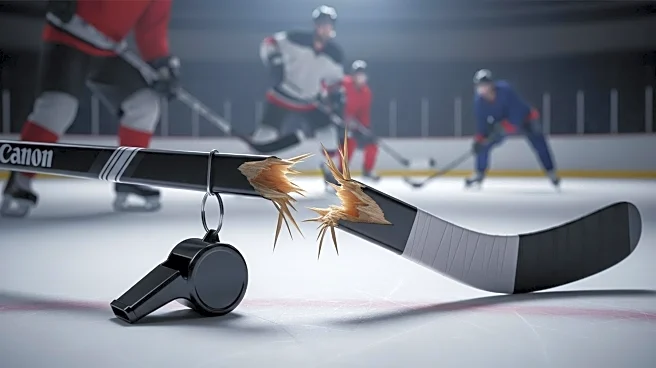What's Happening?
During a playoff game between the Florida Panthers and the Toronto Maple Leafs, NHL referee Chris Rooney was struck in the eye by a player's stick. The incident occurred just 13 seconds into the second period when Rooney was caught in a tussle over the puck. Panthers defenseman Niko Mikkola's stick inadvertently hit Rooney in the face as he was bracing for a hit by Maple Leafs forward Mitch Marner. Rooney received immediate medical attention for a cut above his eye and was ruled out for the remainder of the game. Replacement referee Garrett Rank took over officiating duties. Rooney, who has been a referee in the NHL since 2000, is reportedly doing well after receiving stitches.
Why It's Important?
The incident highlights the physical risks faced by referees in high-stakes sports environments. Rooney's injury underscores the need for enhanced safety measures for officials who are often in close proximity to intense player interactions. The NHL, known for its fast-paced and physical nature, may need to reassess protocols to better protect referees from accidental injuries. This event also draws attention to the critical role referees play in maintaining the integrity and flow of the game, and how their absence can impact game dynamics.
What's Next?
Rooney hopes to return to officiating later in the playoff round, according to reports. The NHL may consider reviewing safety protocols for referees to prevent similar incidents in the future. Stakeholders, including team officials and league administrators, might engage in discussions about improving protective gear or positioning strategies for referees during games. The incident could prompt broader conversations about referee safety across professional sports leagues.
Beyond the Headlines
This incident may lead to discussions about the ethical responsibilities of players to maintain awareness of their surroundings and the potential consequences of their actions. It also raises questions about the cultural aspects of sportsmanship and respect for officials within the NHL. Long-term, this could influence how referees are trained to handle high-pressure situations and navigate player interactions safely.









